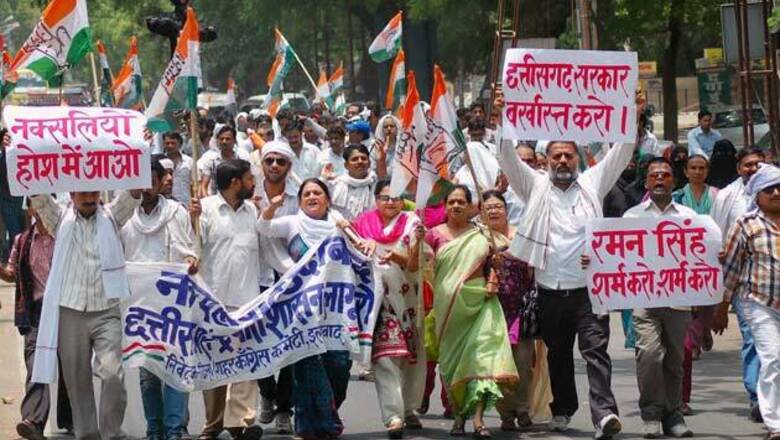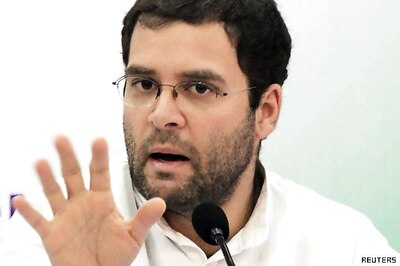
views
Sudeep Chakravarti, author of 'Red Sun: Travels In Naxalite Country', have studied the evolution of the Maoist movement from its early days. How deep-rooted are its support structures and why is the mighty Indian state not being able to tackle this problem like they have done in Jammu and Kashmir and the North-East? Is the state's security-related approach a mistake? Sudeep Chakravarti joined IBNLive readers for an interaction on the issue.
Q. So called development projects have left 5-6 crore people displaced till now. These displaced people are always vulnerable. Why Government did not take up necessary rehabilitation program for them ? Is not government solely responsible for breeding Naxal problem? Asked by: Manab
A. Good evening, friends. A privilege to be chatting with you. While I agree with you, Manab, that govt is largely responsible for the Naxal/Maoist issue (through lack of development, political and administrative corruption, callousness in places where there is less bang for the political buck, mis-governance or non-governance), the answer to displacement is more complex. Government agencies are directly responsible for resettlement and rehabilitation for govt projects. For private sector projects it is duty bound to guarantee free, prior and informed consent, protection for public hearings, and enable law to ensure just R&R measures. As it happens, the Land Acquisition, resettlement and Rehabilitation Bill 2011 is in Parliament, but badly stuck on account of vested interests in politics and business. I guess we are stuck with vast negative energies from displacement -- from lies, obfuscation and plain cheating -- for several more years.
Q. Finance for the movement is from locals or outside. Is there any covert support of any foreign nation? Asked by: sundar1950in
A. The Maoists operate what I call the "Red" economy, Sundar, which is offline. Revenues are generated (this army too must march on its stomach, wear uniforms, be armed) from levies extracted from local businesses and contractors. Maoists are also "Mr Ten per cents". Often, cuts are taken from govt development funds. From what little I know, there is no financial support from a foreign nation. (An aside: during the early Naxalite movement, China provided support to the Naga rebellion but not to those who claimed "China's chairman is our chairman"!)
Q. Anyone who is following this Naxal movement know that Land alienation is the heart of the issue.. Why No government is taking total land reform as an immediate agenda.. I think this single step can overnight solve Maoist problem.. No state (not even "operation barga" famous bengal ) undertook a total land reform which can end feudalism. Asked by: A Raman
A. Land reform is a key factor, Raman, but not the only factor. There are those who propose that securing property and entitlement will solve the problem. And the Forest Right Act, for instance. But Maoists also find recruits in areas of caste oppression (Bihar, UP), where despite land entitlement land is being grabbed or taken by 'legal' deceit (Orissa, Jharkhand, Chattisgarh), where there is grave agrarian and caste crises (Punjab & Haryana, where propaganda activities are quite intense), and so on. To be fair to the Marxists in Bengal, Op Barga enormously helped to secure their rural base -- which they then squandered by arrogance, despotism and corruption.
Q. Can we believe the only way any problem could be solved is by targeting politicians and not innocent civilians and security personnel doing their duty? Asked by: Anonymous
A. Well, Anonymous, you have taken a leaf out the Maoist playbook! A school of thought advocates focused targeting of corrupt politicians and administrators. But it is not always easy, even though there have been spectacular attempts on the lives of politicians for years (Chandrababu Naidu in AP, Buddhadeb Bhattacharjee in West Bengal, for example). This is a very cynical process. Why should lives need to be taken, when mere governance would do?
Q. If the Congress does anything, BJP cries foul and vice versa, hence no progress. We have been listening about this problem since our school days, does it take so long for any kind of problem to get resolved. Asked by: SE
A. Alas, SE, this is the politics that vultures play. It is not only about Maoist-related incidents. Everytime the Congress brings up Gujarat, the BJP brings up anti-Sikh riots. And on, and on an on, for so many other issues. I strongly believe that our political leadership have sold India down the street -- are doing so as we chat. Else, how can it be that a 'problem' that was 'annihilated' in the early 1970s has grown so powerful and determined even as India has undeniably progressed in many spheres and grown quite powerful? There must be serious flaws in our system for it to happen. There is unfortunately little unanimity for key issues. We lack leadership of depth, substance and commitment.
Q. This calls for a national will to resolve this issue. Both, BJP and Congress have ruled, centre and state and have been a failure in finding solution to this problem. Time has come to draw a deadline, organise for talks under any aegis and find a solution. Or the state should now assert....enough of this. Asked by: SE
A. I agree entirely with you, SE. Talks with Maoists must be pushed under any and every aegis. Using any and every strategy, from security pressure to political pressure to local grassroots pressure. We need to gauge and cool the anger that pushes people to take up weapons against the undeniable might of the Indian state knowing they are likely to lead very short lives thereafter.
Q. Did your mighty India tackled the Kashmir and NE state problems? Why can't the Govt win hearts of Dandakarunya tribals? Asked by: nask08
A. Because the government never really tried, nask08. It's not a question of India being 'mighty', but about India being callous and stupid. To deliberately, and repeatedly, neglect people that it wants (our political leadership wants) to call India's own, and yet it treats them with utter arrogance, barbarity and corruption. It got messy in J&K, in NE India, and now it's very messy in Dandakaranya and places where rebelss have stepped in to offer succour -- heavyhanded and imperfect, but well-intentioned, nevertheless -- and offer a mirror to the failings of India as a nation. Hearts can only be won with genuineness of governance and delivery of the criminal justice system, not with glib tokens of bribery before elections. It can be bought with dignity and respect, not treating people like dirt. Sorry if I'm carrying on, but it makes me angry to think how badly successive political leadership have hurt India.
Q. Why can't the policy which compressed the terror in Punjab be applied to eradicate Naxalism Asked by: Janab
A. The 'policy' in Punjab, Janab, was to fight terror with terror. It worked in Punjab, and a lot of Indians supported it because at one level it was also a question of secession -- and one that was also actively promoted by Pakistan as part of its own India policy. But in many cases the bitterness still remains. I believe the situation in Naxal-affected areas is quite different. Nobody here wants to secede from India. And even someone like Bal Thackeray once called Maoists "super patriots", people who see terrible wrong in the imposed ills of India, and want to demolish the system that makes it thrive. We don't have to agree with this ideology, but it is nevertheless a reality. Do we really want to apply the so-called Punjab Policy in places where all people are really asking for is livelihood, respect, dignity and delivery of justice? It's a highly complex issue.
Q. Why don't the Indian State use army to tackle the Maoist problem as the police seem to be completely ill prepared and ill-equipped to handle this menace? Asked by: vinuaryan17
A. For one thing, vinu, the Army does not want to be directly involved in combating Maoists. Sevral army chiefs have said so on record. Indeed, yesteday the defence minister of India reiterated his position that the Army would not be used to combat Maoists. They see it as a law and order issue -- besides, the army already has a very bad rap tackling rebellions in Kashmir and north-east India, for example, and may not want any more bad press. It is also primarily used in defence against external threats, not internal ones. I am in complete agreement with the army's position on this. There is no option except to upgrade the training, equipment for the police (and reduce corruption so security-related money is not, say, spent on buying SUVs for ministers, as happened in Jharkhand)to get its act together. So too paramilitaries. And, more importantly, none of this will work unless the vacuum created by eradication of left wing extremism is filled with development and governance and delivery of justice.
Q. How can we expect the problem to be resolved as the politicians are not interested in addressing the issue threadbare. How else can you explain them raising a hue and cry when they are targeted (Sonia Gandhi shedding crocodile tears, Rahul Gandhi trying to look tough etc) If they were interested they would have started taking action when the 74 security personnel were killed wnd started the NIA investigation etc the. why do they act only when they r targeted? Sad story of Indian polity. Asked by: AKS
A. I can't put it any better than you, AKS!
Q. Most of the Maoists leaders are well educated.What inspires them to get into the movement? Asked by: sundar1950in
A. From what little I have gathered, Sundar, genuine anger against a political system that does little (in spite of constitutional guarantees and fine laws) to protect the really oppressed and downtrodden in India. For them it's not a cliche. I guess they are not quite impressed with the "mall stupor" as I call, of a substantial part of urban and urbanized India! I don't support the Maoists, but I dare say I understand some of what they stand for.
Q. Sir, I know that Naxalism a very severe problem for the country and its democratic structure but don't you think what happened a couple of days back was shear retribution by the Maoist to the violence they suffered by Salwa Judum. I feel how the situation was handled by Karma was no better than how some African states run. Your take on that Asked by: Kisalay
A. Kisalay, hi. A Maoist leader in Chhattisgarh has pretty much said what you have in a statement issued earlier today. I abhor violence, even what killed Mahendra Karma and so many others -- many innocent of any wrongdoing. But what Mahendra Karma did was a crime against humanity by any definition. I hope posterity remembers that, even as it must apply similar yardsticks to crimes committed by Maoists against innocents.
Q. Is there any solution to the Naxal problem..or it will continue to exist.. Asked by: Rohit
A. There are several solutions to the Naxal issue, Rohit, but none that are likely to appeal to the political leadership of India and of the states where such issues exist. I would say why waste precious lives and resources when mere governance would do. But would our political and administrative leadership?
Q. Why is it that none of the states, of Orissa, West Bengal, Jharkhand, AP, Bihar, Chattisgarh, Maharastra have been successful against this movement. Asked by: SE
A. This is not strictly true, SE. AP has seen partial success. It combined strong (even brutal) policing with strong rehabilitation policy for rebels. Special forces (Greyhounds)over the years infiltrated the movement, and the state also modernized remote police stations and provided better training and equipment to its forces. In West Bengal the Maoist movement is at present in disarray. But you're right in that the issue and problems do not permanently disappear. bad governance and corruption continue to ensure the problem either persists or recurs. AP is already facing a problem of leftwing extremist resurgence around its northeastern borders with Orissa; and AP in general continues to be vulnerable to rebellion.
Q. Many ministers are saying that they are not able to do development works in some districts where Naxals are Enemies of development.. But who are stopping them to develop vast region of our country where no Naxal presence is recorded? I live in Bengal, where till now no Naxal activities are seen, but is extremely backward. Why? Asked by: Kanishka
A. Well, there has been much 'Naxal' activity in Bengal, Kanishka. Indeed, Naxalbari, the place from which the 1960s movement derived its name (and which is now used to call a Maoist 'Naxali') is near Siliguri in northern Bengal! But your observation about lack of development is one hundred per cent. If others like you gathered enough momentum to call the bluff of our putty-spined and quite venal politicians, real and positive change might actually accrue.
Q. State violence to counter the Maoist violence can not be getting the result.Is there any alternate plans being worked out? Asked by: sundar1950in
A. Absolutely, Sundar: state violence to counter Maoist violence is getting nowhere. Salwa Judum is a prime example of it -- it has bred great resentment too; and significantly, other Maoist-affected states have deliberately not adopted this warped Chhattisgarh model. While there are several plans in play, the one that strikes me as being close to effective (at least in theory) is the Intergrated Action/Development Plan route being pushed by central minister Jairam Ramesh. Particularly in two areas of Jharkhand, Saranda and the Saryu area. It calls for combining police action with creating secure hubs of healthcare and governance in areas vulnerable to Maoist activity. Let's see where it heads. Jairam has been dashing about like a dervish, but good intentions don't always translate well in India.
Q. We use to to say Indian communists wanted to keep the indian poor permanently poor then only they can claim the tag poor mans party(though many of their Kerala party leaders are millionaires). Now I think Maoists wanted to take this credit by not allowing any development reach remote area? Asked by: Prathap
A. Well, Prathap, India's political leadership got there first! OUr leadership in many cases has deliberately withheld the development of several areas, for several decades. Seriously, though, there is a point in what you say about Maoists. But they look at it as a strategy. By denying access to govt-sponsored development, they have a hold on their target population -- and at the same time prevent ingress of govt forces by denying roadworks, etc in such areas. Instead, they would prefer to impose their own form of commune-led government, as practiced experimentally by the "janatana sarkar" in parts of the Dandakaranya region in southern Chhattisgarh. There are several flaws in their argument, but there it is. And with this, ladies and gentlemen, may I take your leave? And a thousand thanks for taking the time to ask such thoughtful questions. I hope I have been able to answer some of them, or at least whet your appetite to find answers. Peace and prosperity to us all. Jai democracy.



















Comments
0 comment